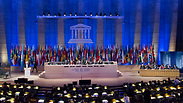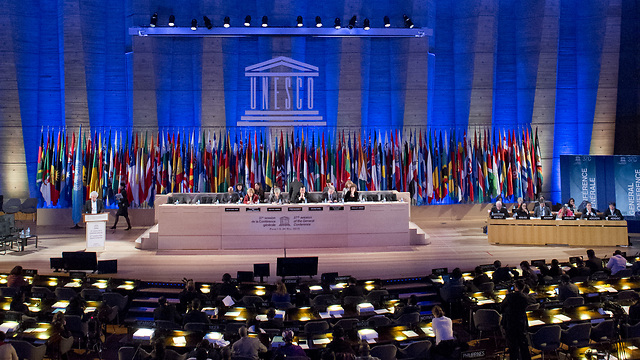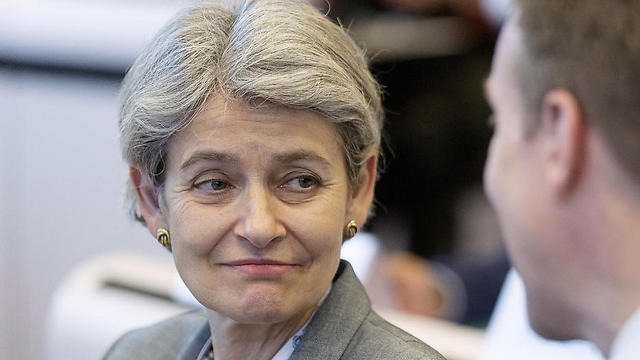
The United States said Thursday that it was pulling out of the UN's culture and education body, accusing it of "anti-Israel bias" in a move that underlines Washington's drift away from international institutions.
Following years of tension at UNESCO, which is in the process of electing a new director-general, US State Department spokeswoman Heather Nauert announced that Washington planned to withdraw.
"This decision was not taken lightly, and reflects US concerns with mounting arrears at UNESCO, the need for fundamental reform in the organization, and continuing anti-Israel bias at UNESCO," she said in a statement.
The United States has walked away once before under ex-president Ronald Reagan, who quit UNESCO in 1984 over alleged financial mismanagement and claims of anti-US bias in some of its policies.
President George W. Bush announced America's return in 2002, but relations soured again in 2011 when Barack Obama pulled the plug on funding to the body after its members voted to admit Palestine as a full member.
Washington opposes any move by UN bodies to recognize the Palestinian territories as a state, believing that this must await a negotiated Middle East peace deal.
But President Donald Trump's administration is also reviewing many of its multilateral commitments, pursuing what he calls an "America First" policy that has allies in Europe worried.
"UNESCO is about promoting our ideals and values through culture, education and science," France's UN ambassador Francois Delattre told reporters in New York, adding that "we need an America that stays committed to world affairs."
Israel, which remains a UNESCO member, said the move by the Trump administration marked a "new era" for the United Nations and showed there was a "price to pay for discrimination against Israel".
"In recent years, UNESCO has transformed itself into an absurd organization that lost its professional path in favor of the political interests of certain countries," said Carmel Shama-Hacohen, Israel's representative at the organization.
"my personal recommendation to Prime Minister Benjamin Netanyahu is to stick by the United States and immediately withdraw from UNESCO," he added.
The US decision, first reported by Foreign Policy magazine, comes as European powers face another setback in their efforts to lobby Trump to respect Washington's international commitments.
In June, he said he would withdraw from the 2015 Paris climate change agreement, and later this week he is set to accuse Iran of failing to respect a nuclear deal negotiated by world powers in the same year—taking the opposite view of his allies.
The outgoing head of UNESCO, Irina Bokova, called the US withdrawal a "loss to multilateralism", while UN Secretary General Antonio Guterres said through a spokesman that he "regrets this development deeply".
"At the time when conflicts continue to tear apart societies across the world, it is deeply regrettable for the United States to withdraw from the United Nations agency promoting education for peace and protecting culture under attack," Bokova said.
Observer mission
UNESCO was once a low-profile UN agency best known for producing a list of World Heritage sites such as the Grand Canyon or Cambodia's Angkor Wat, as well as running science, media and cultural programs internationally.But in addition to the decision to admit the Palestinians in 2011, it has been the scene of repeated diplomatic flare-ups after Arab countries succeeded in passing a number of resolutions critical of Israel.
In May, Israel was infuriated by a resolution identifying Israel as "the occupying power" in the divided city of Jerusalem and calling on it to rescind any move changing the city's "character and status".
In July, the agency again delighted Palestinians when its members declared the Old City of Hebron in the West Bank an endangered World Heritage site—described as "another delusional decision" by Israeli Prime Minister Benjamin Netanyahu.
The agency's board members are set to vote this week to elect a new director-general, with Arab candidates from Qatar and Egypt vying with a French competitor.
Washington's withdrawal is set to take effect on December 21, 2018, when it will establish an "observer mission" to replace its representation at the agency.
"It has nothing to do with the director-general race," a spokesman for the US mission told AFP. "We'll be voting this evening."
Francois Heisbourg, chairman of the International Institute for Strategic Studies, said the decision was probably motivated by Trump's desire to send a message of support to Israel and underlined his "America First" policies.
"UNESCO is an easier target than others: it's relatively small, it doesn't concern vital interests, and UNESCO has gone much further than other UN organizations in recognizing the Palestinian authorities," he told AFP.



















